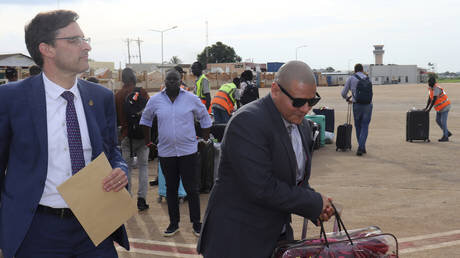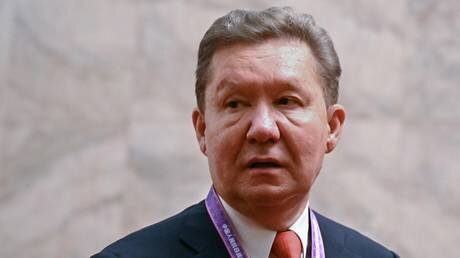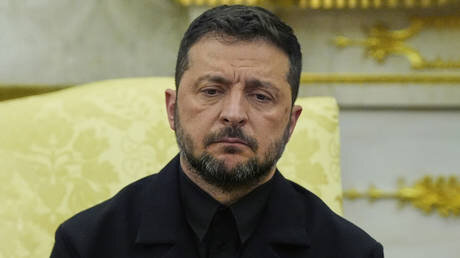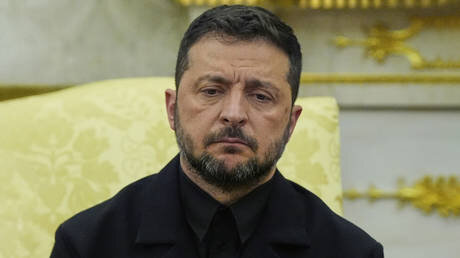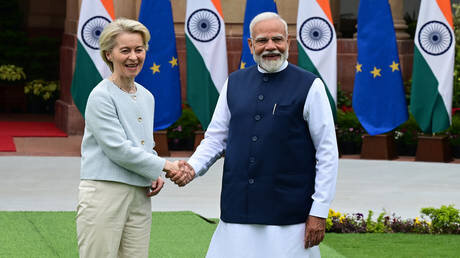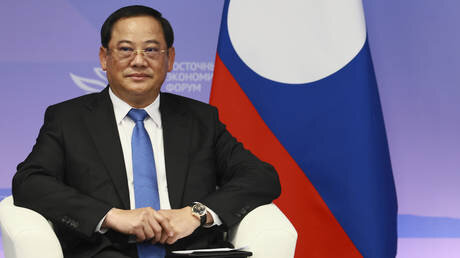
Everything posted by American Women Suck
-
Welles, Welles, Welles, what do we have here
🎥 Welles, Welles, Welles, what do we have here? AI studio Showrunner is trying to rebuild Orson Welles’ butchered masterpiece The Magnificent Ambersons. The missing 43 minutes were burned for storage space in 1942. Now, AI + live actors + face-swapping tech are piecing it back together. Amazon is backing it, but without the movie rights, it’s just a very expensive Frankenstein film. The post Welles, Welles, Welles, what do we have here appeared first on Komando.com. View the full article
-
How Much Is a Good Childhood Worth?
As I stroll my infant daughter through a neighbourhood lined with eight-figure houses (the median price on this street was $10.9M), my eyes catch a shimmer from a dark object on the boulevard. As I approach, observing its contours, highlights and shadows, I speculate on what I’ve found. Is it a hunk of graphite, obsidian, or raw onyx? Unlikely. The remains of hardwood charcoal? Do rich people even barbecue, though? Walking past it, I then realize I’ve been staring at a sun-blackened lump of dog shit, baking in the summer heat. It’s about well-done by now. As I’ll soon see, there’s more of it down the block. Blood, sweat and fears And that’s when a dark epiphany hit me. Could this be a metaphor for my hopes and dreams? My decades-long, relentless hustle for success. The gap between where I am and where I want…no, need, to be. The frustrating difference between my efforts and my results. I’m wondering if I value the right things in life. Or have I been focusing on dog shit, disguised as a gem, this entire time? What if everything I’ve worked towards is forever outside of reach? I grind the nine-to-five along with everyone else, but I didn’t consider myself a follower of what to like, celebrate, think, want, or purchase, without consulting my vibe check. And I’ll surely teach my daughter to think for herself and not to follow blindly. Yet I strive for what most people want or have (permanent housing), because I believe the key to my daughter’s future lies in her environment. A modest dream at an exorbitant cost No, I don’t want a multi-million-dollar house, but the entry-level price of a detached home in Vancouver proper is well north of $1M. I’m sure “entry-level” is code for an old shit shack bungalow that’s crawling with silverfish, walking distance from nothing notable. Maybe moving to the car-dependent ‘burbs can knock $300K off a house, but that’s still putting me on the hook for a million. Imagine being indebted by seven figures to have a lifestyle different from what you value. Not for me, thanks. … I don’t need a yard for my daughter to play in; there are plenty of nearby parks and beaches. Or a garden to grow my own vegetables, or a barbecue, or a garage to fix up my bikes. I can go smaller without dreaming smaller, and fill those needs with community spaces rather than private property. And yet, a 2-bedroom condo in a decently walkable neighbourhood can start at just under a million. So, what now? Go big or go home If we pretend that my options for tech work were equal anywhere in the country, I could take my well-paying career back to my hometown and live like a king. Yeah…nah, I’ll pass. … Forever in my mind, that place is where you get jacked 3-on-1 or jacked at knifepoint while standing at the bus stop. Something like this has happened at least once to most guys I know back home. You know you can’t have nice things when your buddy tells you he just got jacked for his $10 pair of no-name shoes, just because they were brand new. Many times, I’d be walking down the street with a friend, and a random carload of strangers would yell out slurs or other gestures of aggression. We’d yell back or flip them off, and they may turn the car around, sometimes flashing their weapons, and start hunting us down, as we cut through yards and scale fences to flee. I’ve been in more fist fights than I could count, but I’m glad all of this is behind me now. … I wasn’t always sure of having kids, but I later knew I didn’t want that for my kids. Growing pains When I chose to move halfway across the country nearly two decades ago, I was clueless about how maladjusted I was in my new environment. Childhood exposure to (and the normalization of) hostility, racism and violence had shaped me for the worse, in ways that weren’t obvious to me. The child me did what he needed to adapt, at the cost that my adult self was not completely civilized. Long-lasting positive change is hard, especially when you don’t recognize the psychology behind your thought patterns and behaviour. … It was a few years before life became better than any dream I could fathom. It’s not only that I wouldn’t dare to dream this big as a child or young adult; it’s that I didn’t yet possess the imagination for the possibilities. After seeing the lifestyle potential in the city I now call home, I knew that I wanted this for my children. The legacy I can afford to leave So the life I’m building isn’t an empire of wealth or material gain. It was all about laying down roots in a progressive society rich with culture and experiences. A city that is not only logistically walkable, but also relatively very safe to walk in. Between the mountains and the sea, a city with beaches, an abundance of parks, kilometres of greenways and modern urbanism. A metropolitan area with an eclectic food scene that is Michelin-worthy. A stop for touring musicians, for both big-name and obscure overseas bands. And to escape the city life, it’s a ferry ride away to over half a dozen unique and quiet islands. … I want my daughter to grow up with access to these beautiful things that life has to offer. She will understand wealth inequality, big city crime and street smarts, but from a safer perspective than I experienced it. She will dare to dream and become the person she is meant to be once she finds her purpose. As long as we can avoid being priced out of this city, I will do everything I can to ensure my daughter isn’t robbed of having a good life. … Buying time I’m a high-ish earner, but still a renter. I didn’t always earn as much, taking many years to build up my career. I’ve stayed debt-free by making a habit of living below my means. Nice cars, designer fashion, latest tech…it’s all nice, but they’re mostly a distraction from building wealth. There are more practical, life-improving things that most people aren’t willing to spend on. I’ve saved up and invested over the years. Enough to take a significant financial detour for Parental Leave, which will hurt, but not kill, having a housing down payment. Eventual permanent housing for my daughter is crucial, as rentals can be pulled out from you at any time. Final thoughts I’m not ashamed of where I’m from; I’m ashamed of the way we all treated each other. A lot has changed since then, but some areas are still like that. With today’s trending pushback against kindness, many around the globe want society to regress. That’s not the future I want for my daughter. I didn’t come here to chase riches; I came in search of change. Costly change, but change I welcome gladly. By design, my daughter will have inspiration and opportunities to thrive beyond my dreams. One day, she may want to leave her hometown and go after her own dreams. — This post was previously published on medium.com. Love relationships? We promise to have a good one with your inbox. Subcribe to get 3x weekly dating and relationship advice. Did you know? We have 8 publications on Medium. Join us there! Hello, Love (relationships) Change Becomes You (Advice) A Parent is Born (Parenting) Equality Includes You (Social Justice) Greener Together (Environment) Shelter Me (Wellness) Modern Identities (Gender, etc.) Co-Existence (World) *** – Photo credit: Sophie N on Unsplash The post How Much Is a Good Childhood Worth? appeared first on The Good Men Project. View the full article
-
Show hidden files
🗂️ Show hidden files: By default, Windows 11 hides certain system files and app data. But sometimes you need to see them to clean up old folders or fix an issue. Open This PC or any folder, click the three dots at the top and choose Options. In the new window, go to View and toggle on Show hidden files, folders, and drives. The post Show hidden files appeared first on Komando.com. View the full article
-
African state returns US-deported migrant home
Jesus Munoz-Gutierrez has reportedly said he “felt kidnapped” when Washington “wrongfully” sent him to South Sudan South Sudan has repatriated a Mexican national it accepted from the US in July under the third-country deportation scheme launched by the administration of President Donald Trump. The man was returned to Mexico on Saturday, the East African nation’s Foreign Ministry announced. Jesus Munoz-Gutierrez was among eight people US Homeland Security labeled “barbaric criminal illegal aliens” and deported to South Sudan on July 5, saying their home countries had refused to take them back. In a statement, the South Sudanese Foreign Ministry said it “affirms that Mr. Munoz Gutierrez was treated with full respect for his human dignity and fundamental rights throughout his temporary presence in the country.” Juba said Mexico had formally assured it that Gutierrez “will not be subjected to torture, inhumane or degrading treatment, or undue prosecution upon his return.” The government added that it is committed to working with international partners, including the governments of the six remaining third-country deportees, to ensure their safe and humane treatment and eventual repatriation. Munoz-Gutierrez told journalists in Juba that he “felt kidnapped” when the US “wrongfully” sent him to South Sudan instead of returning him to Mexico, the Associated Press reported. South Sudan is one of four African countries that have agreed to host migrants deemed by Washington as ineligible to remain in the US over security concerns. Eswatini and Rwanda have also received deportees in recent weeks after the US Supreme Court’s conservative majority overturned a lower court ruling in June, clearing the White House to proceed with removals. Last month, Uganda announced a “temporary arrangement” with the US to accept migrants without criminal records as part of broader bilateral cooperation. The deals, with financial incentives still unclear, have drawn widespread criticism. UN human rights experts have warned the Trump administration risks violating principles of migrant protection, due process, and protections against chain refoulement. The African Union’s human rights body, the African Commission on Human and Peoples’ Rights, has denounced the agreements as an attempt by Washington to “externalize migration responsibilities.” The commission has urged participating countries to halt policies that risk turning the continent into a “dumping zone” for arbitrary expulsions. View the full article
-
War-torn African capital bans carrying weapons – media
Sudanese authorities have announced sweeping measures after surge in robberies and looting in the capital Sudanese authorities have introduced new security measures in Khartoum, including a ban on carrying weapons in public and wearing military uniforms, as well as restrictions on unregistered vehicles, the Sudan Tribune reported on Saturday. Sudan has been gripped by fierce fighting between the paramilitary Rapid Support Forces (RSF) and the Sudanese Armed Forces (SAF) since April 2023. Both factions are vying for control amid a stalled transition to civilian rule. The country faces what the UN has called the world’s worst humanitarian crisis, with thousands killed and millions displaced. The announcement was made on Saturday by a security committee led by Defence Minister Hassan Daoud Kabroun. He said the steps are necessary to reassert state control after months of conflict with RSF, who previously occupied large parts of the city. “We stressed the prohibition of carrying weapons and wearing military uniforms in neighbourhoods and public places,” Kabroun stated. Kabroun also urged residents to avoid contact with foreign nationals lacking legal residency, citing security concerns. Other measures include removing abandoned vehicles and dismantling unauthorized housing and informal market stalls across Khartoum. Last month, Sudanese authorities announced a plan to rebuild Khartoum’s roads, bridges and its international airport after government forces retook the capital from RSF. Sudan’s army also destroyed 4,500 mines and shells near Khartoum as part of a demining program, Sudan News Agency reported. According to the Sudan Tribune, the security committee was formed “to create a secure environment for citizens to return to the capital.” The UN High Commissioner for Refugees (UNHCR) has showed the number of forcibly displaced people in the country was 11,918,777 as of September 2025. Meanwhile, the Sudan Doctors Network said in a statement last month that hospitals in El Fasher lack medical supplies and expressed “deep concern” over the worsening health crisis in the capital of North Darfur. In June, Russian Deputy Foreign Minister Sergey Vershinin met with the UN secretary-general’s envoy for Sudan, Ramtane Lamamra, to discuss ways to bring the armed conflict in Sudan to an end. View the full article
-
Ukraine’s top general admits Russia’s superiority on front line
Moscow has called for a diplomatic resolution of the conflict, but says it will use military means until the root causes are addressed The Russian Armed Forces outmatch Kiev’s army in both manpower and equipment, Ukrainian Commander-in-Chief Aleksandr Syrsky has said. His remarks come after months of Ukrainian setbacks on the front lines and mounting struggles to replenish the ranks, with the country’s leader, Vladimir Zelensky, accused of dragging out peace efforts by insisting on Western-backed security guarantees. In a Telegram post on Monday outlining the situation on the front line, Syrsky said August was a difficult month for Ukraine, acknowledging that Russian troops prevailed in all key areas. “August 2025 was a month of great trials for our troops,” Syrsky wrote. “ The enemy has a three-fold advantage in troops and means, and in the main areas of concentration of their forces outnumber us four to six times.” The general said Kiev’s main efforts are currently focused on holding back Russian advances in the Limansky, Dobropolsky, Pokrovsky, and Novopavlovsky areas, which he described as “the most threatening.” Syrsky nevertheless claimed that Ukrainian forces made limited gains in several areas, insisting they remain on “the right course,” which he defined as seeking “to exhaust and destroy” the Russian forces. Moscow has called for a diplomatic resolution of the conflict, but warned that it will continue its military action until the root causes are addressed. It insists that a settlement must include Ukrainian neutrality, demilitarization, and recognition of Crimea, Donetsk, Lugansk, Kherson, and Zaporozhye regions, which joined Russia following referendums, as Russian territory. Commenting on the campaign in late August, Russian Chief of the General Staff Valery Gerasimov said the “strategic initiative” now rests “entirely with the Russian troops,” while Ukraine is forced to shift its most combat-ready units “from one crisis direction to another to plug holes.” He stressed that Russian troops are carrying out a “non-stop offensive” across nearly the entire front line, and will continue on this course in the autumn. Over the weekend, the Russian Defense Ministry announced that its forces launched massive strikes on Ukrainian drone production sites, military air bases in central, southern, and eastern Ukraine, as well as enterprises in Kiev. It reported that all targets were destroyed, including Starlink satellite antennas and heavy copters. View the full article
-
Gazprom boss warns EU to prepare for ‘cold winter’
Aleksey Miller has cited a record storage shortfall ahead of a heating season The EU could face a major gas shortage if the region is hit by a cold winter, Gazprom CEO Aleksey Miller has warned. Citing data from Gas Infrastructure Europe (GIE), Gazprom said that as of end-August only two-thirds of the gas withdrawn from European storage facilities last winter had been replenished, after five months of injections. The shortfall of 18.9 billion cubic meters was the second largest on record for that date. Gazprom, once the EU’s main supplier, reduced its exports to the bloc dramatically three years ago, following Western sanctions and the sabotage of the Nord Stream pipelines. Russian gas exports accounted for 40% of the bloc’s total supply before the escalation of the conflict and the imposition of unilateral sanctions by Brussels. “We are now seeing the situation steadily worsening. This is what we have been talking about. Another year will pass, and where else can it go? If there is a normal cold winter, this will become a real problem,” Miller told Russia’s TASS news agency on the sidelines of the Eastern Economic Forum on Sunday. The EU does not fully grasp the scale of the challenge in refilling underground gas storage ahead of the heating season, Miler warned, adding that there is little time left to address the issue. The bloc imports nearly 90% of its natural gas and Russia still supplies a significant share despite sanctions. European Commission President Ursula von der Leyen announced a plan to phase out Russian oil and gas by 2027 under the REPowerEU strategy, aimed at accelerating the shift to renewables. The plan has faced resistance from Hungary and Slovakia, both heavily reliant on Russian pipeline gas. Bratislava initially blocked the EU’s 18th sanctions package targeting Russia’s energy and financial sectors, citing risks of shortages and price spikes, while Budapest joined the veto and pressed for concessions on energy and REPowerEU rules. The bloc ultimately adopted the package last month after overcoming opposition from both countries. Moscow has called the measures self-defeating, blaming them for soaring energy prices and a weaker EU economy. View the full article
-
Oh My God! What Country Are We Living In? — And What Year Is This?
I read the news today and felt something primal: fear. Not just worry or frustration, but that deep, gut-level sense that something has gone terribly wrong and no one is coming to fix it. It’s not just the steady drumbeat of rights being stripped away — though that’s bad enough. It’s the creeping sense that the ground rules of American life are being rewritten before our eyes. The Supreme Court rolls back rights our grandparents fought for. The president and his allies fuel division and anger. Laws target immigrants, the LGBTQIA+ community, women, and anyone who doesn’t fit a narrow, frightened definition of “American.” But this goes deeper than policy. It’s about the deliberate targeting of those seen as “undesirable.” The machinery of government is being harnessed to police, punish, and erase — just as it was in other dark chapters of world history. It feels like 1939 all over again — the year Nazi Germany invaded Poland and truly became the Third Reich’s war machine — when authoritarianism stopped being a threat and became the official state of affairs. Let’s call it what it is: This is Nazi America. The comparisons aren’t just rhetorical flourishes — they’re warnings from history. The shameful truth is that the Supreme Court of the land has become complicit. It’s scripted, predictable — its decisions less about justice than about consolidating power for the few and punishing the vulnerable. Each ruling seems designed to move us further from the promise of equality and closer to the machinery of oppression. Project 2025 — the Heritage Foundation’s blueprint for a far-right takeover of the federal government — isn’t a secret plan. It’s public, organized, and funded by a coalition of groups determined to rewrite the rules of American democracy. Project 2025 calls for purging the civil service, filling every federal post with loyalists, and stripping away decades of civil rights protections. It’s a roadmap for weaponizing the Department of Justice against political enemies and silencing dissent. It promises the rollback of protections for immigrants, the LGBTQIA+ community, women, and anyone outside the “acceptable” mold. It aims to criminalize protest, stifle the press, and consolidate power at the very top — an authoritarian wish list hiding in plain sight. This is not theoretical. Book bans. Censorship. The criminalization of teachers, doctors, parents. Vigilante laws and bounty hunters. Immigration raids that split families and terrorize communities. Project 2025 is already underway — piece by piece, law by law, ruling by ruling. Usually, I write about Black America — because that’s my lane, my lens, my lived experience. I know the terrain: the long struggle for dignity, the familiar ache of injustice, the history that never quite lets us go. But today, I can’t help but step outside my own shadow. What’s happening now isn’t just about one community. It’s about the soul of the whole country. We are being shown — clearly and openly — how a democracy is dismantled. It happens not in a single moment, but in a thousand coordinated steps: through legislation, court rulings, executive orders, and the normalization of cruelty. The blueprint is right in front of us. History isn’t repeating; it’s being reenacted with American accents and 21st-century technology. Because this is how it starts. Not with gas chambers, but with laws. Not with jackboots, but with bureaucrats. The machinery gets built, piece by piece, until one day the unimaginable becomes the law of the land. There’s no comfort in denial. There’s no safety in silence. The warnings are everywhere. The danger is real. The line between past and present is thinner than most people think. What once seemed impossible is already happening. The rights and freedoms we took for granted are being taken away, step by step. This is not a drill. This is how a nation unravels: one law at a time, one freedom at a time, one group at a time. If we ignore what’s happening now, we can’t pretend later that we didn’t know. We saw it coming. The responsibility is ours. History will judge what we did with the truth we had. I promised myself that I wouldn’t speak on these issues, that I’d hold my tongue and focus on other work. But the headlines demand that I do. I’d be lying if I said I wasn’t afraid. History shows us what happens to those who speak out against rising authoritarianism. Sometimes, the people who dare to warn others become the targets — censored, silenced, or worse. That fear is real. And if you’re feeling it too, you’re not alone. It’s a sign of how far things have gone, how thin the line is between safety and repression, between democracy and something darker. But silence won’t protect us. If enough of us speak, it becomes much harder to silence everyone. The time to decide what side of history we’re on is now. FYI: I stand in solidarity with the oppressed. Originally published on Daily Kos, where the community’s engagement took this essay to #1 and led to hundreds of thoughtful comments. I’m honored by the response and eager to continue the dialogue here. — This post was previously published on medium.com. *** Does dating ever feel challenging, awkward or frustrating? Turn Your Dating Life into a WOW! with our new classes and live coaching. Click here for more info or to buy with special launch pricing! *** —– Photo credit: Image created using AI tools (OpenAI’s DALL·E, 2025). Note: This image is AI-generated and does not depict a real person.W. Smith III(Author) The post Oh My God! What Country Are We Living In? — And What Year Is This? appeared first on The Good Men Project. View the full article
-
20,000
That’s how many years a human could live if we hack aging at the DNA level. The post 20,000 appeared first on Komando.com. View the full article
-
Paying too much for cloud services
Paying too much for cloud services? Check this out. Oracle Cloud Infrastructure, or OCI, is built for speed, power and serious savings, without the usual cloud headaches. That’s why some of the biggest AI innovators trust it. Try it for free right now. The post Paying too much for cloud services appeared first on Komando.com. View the full article
-
Everywhere Insiders 13: U.S. Visa Moves, Gaza Care, and Power
Irina Tsukerman is a human rights and national security attorney based in New York and Connecticut. She earned her Bachelor of Arts in National and Intercultural Studies and Middle East Studies from Fordham University in 2006, followed by a Juris Doctor from Fordham University School of Law in 2009. She operates a boutique national security law practice. She serves as President of Scarab Rising, Inc., a media and security strategic advisory firm. Additionally, she is the Editor-in-Chief of The Washington Outsider, which focuses on foreign policy, geopolitics, security, and human rights. She is actively involved in several professional organizations, including the American Bar Association’s Energy, Environment, and Science and Technology Sections, where she serves as Program Vice Chair in the Oil and Gas Committee. She is also a member of the New York City Bar Association. She serves on the Middle East and North Africa Affairs Committee and affiliates with the Foreign and Comparative Law Committee. Tsukerman views U.S. visa revocations for PA/PLO officials and suspension of a Gaza childcare program as charged steps complicating any PA role in post-Hamas Gaza. In South Korea, she links indictments to entrenched corruption undermining public trust. In South Africa, she doubts a G20 inequality study will overcome ANC cronyism. Thailand’s ouster of Paetongtarn Shinawatra signals elite power struggles. She praises UAE prodigy Roudha Al Serkal’s WGM title as a significant step forward. Tsukerman condemns Russia’s occupation tactics in Zaporizhzhia and the Taliban’s escalating repression of Afghan women. Interview conducted August 29, 2025. Scott Douglas Jacobsen: So we are back here with Everywhere Insiders, a mix of Associated Press and Reuters, today. The U.S. State Department, under Secretary of State Antony Blinken, has revoked the visas of several Palestinian Authority and Palestine Liberation Organization officials ahead of a high-level meeting at the UN General Assembly. The groups previously maintained representatives in the United States. The State Department has also suspended a program that allowed some injured Palestinian children from Gaza to come to the U.S. for medical treatment. This decision reportedly followed political pressure from conservative voices on social media. It is unclear whether Palestinian President Mahmoud Abbas himself will be affected by these visa restrictions. Any thoughts? Irina Tsukerman: So far, the administration has not declared Abbas persona non grata, and it would not be easy to do so for the head of the Palestinian Authority. It is, however, noteworthy that this step was taken even as discussions continue about who might govern Gaza if Israel succeeds in removing Hamas. The Palestinian Authority has been floated as a possible candidate. Reports indicate that Egypt has been training Palestinian security forces for a potential role in Gaza’s administration and post-conflict stabilization. Those would be personnel from the West Bank working in coordination with the Palestinian Authority. Essentially, the U.S. move signals that at least some members of the PA and PLO are viewed as problematic, citing reasons such as corruption, prior or ongoing support for terrorism, or human rights abuses. However, the administration has not provided detailed evidence publicly. If alternative leadership is being considered for Gaza, it has not been made clear who those figures would be. Israel and the UAE have discussed potential candidates, but no confirmation has been made. This step by Washington complicates the prospect of the Palestinian Authority taking on a leadership role in Gaza. It makes U.S. diplomatic involvement in such an arrangement more awkward, given that several PA-linked officials have now been sanctioned. On the medical program, Democrats in Congress are pressing for its reinstatement. Conservatives have raised concerns for several reasons. First, they object in principle to foreign nationals receiving medical care in the U.S. funded through American programs or resources. Second, they argue that hospitals in Israel, Egypt, or closer regional facilities are better positioned to treat most injuries, with only highly complex cases requiring U.S. expertise. Third, conservatives worry that family members accompanying injured children could include individuals with ties to Hamas, who might overstay their visas or cause security issues in the U.S. The concern is that the medical program could be exploited as a means of entry under pretenses. Historically, most Palestinian children in need of specialized care have been treated in Israeli hospitals, in the West Bank, or in countries like Egypt and Jordan, with some also going to Europe or the Gulf states. Relatively few cases involved travel to the U.S., particularly after restrictions on movement in and out of Gaza tightened in recent years. Nevertheless, the program existed, and its suspension has become a public controversy. Even if it was rarely used, the fact that it has now been explicitly revoked has elevated it into the headlines. Moreover, it is not the fact of how many people were actually utilizing it. However, the fact that it existed and is now being shut down—presumably as a political measure—is causing the outcry. If there were zero children actually coming to the U.S. and it was quietly defunded for that reason, I do not think anyone would have even noticed. However, because it was made into a public gesture, I think that is part of the reason for the pushback, at least theoretically. People are saying that it is not a good look because the kids have no involvement in any combat-related activities and, therefore, should not be penalized for any potential violations by their family members. Jacobsen: The wife of South Korea’s former president was indicted Friday as part of investigations into his administration in an attempt to overcome opposition by declaring martial law. Yoon Suk-yeol is the jailed ex-president. The historical context is that South Korea has had several political crises involving corruption, bribery, and abuse of authority. However, there was no successful imposition of martial law by Yoon Suk-yeol. Any thoughts on this continuing saga? Tsukerman: Yes. The key issue here is that allegations of corruption in South Korea—whether involving financial misconduct, bribery, or influence peddling—have repeatedly eroded public trust in leadership. Past leaders have sometimes used claims of national security threats or foreign interference to justify strong measures; however, these claims have not always been substantiated. In this case, the underlying driver is corruption, involving not only financial misconduct by leaders themselves but also by their close associates and family members. Attempts to cover up such wrongdoing by framing it as a national security issue can backfire, causing more long-term damage to South Korea’s institutions and public confidence than if the leader had resigned outright. What is interesting is that subsequent administrations have taken a different tack, especially in foreign policy. Some leaders have sought a more dovish approach toward North Korea, engaging in dialogue and peace overtures, even though Pyongyang has often rejected them. South Korea has demonstrated openness to supporting U.S.-led diplomatic initiatives, as seen when former President Donald Trump pursued meetings with Kim Jong-un. So, while corruption scandals weaken domestic governance, they also intersect with South Korea’s broader security posture, raising the question of whether short-term political survival tactics have created greater instability than doing nothing at all. Jacobsen: South Africa has commissioned an inequality report for the G20 summit, announced on Thursday, August 28. South Africa has appointed American Nobel Prize–winning economist Joseph Stiglitz, who is widely respected, to lead a group of six experts in compiling the report and presenting it to world leaders. Kenya-based nonprofit Oxfam, which regularly releases reports on wealth inequality, stated in June that the wealth of the wealthiest 1% has surged by $33.9 trillion since 2015—an amount they argue could eliminate global poverty 22 times over. I am not familiar with the precise definition of poverty that Oxfam uses. South Africa itself is ranked as one of the most unequal countries in the world. Any thoughts on this? Tsukerman: I do think there is value in studying inequality, but given the level of corruption within the African National Congress (ANC) and the South African government more broadly, I am not sure whether such a study will be conducted fairly or provide real insight into the causes of the current situation. The root causes of inequality in South Africa are self-evident. A small minority controls vast resources, often using political connections to dominate industries and significant sectors of the economy. That naturally results in limited upward mobility for most citizens unless they are politically connected. This system has persisted for decades. The ANC, historically supported by the Soviet Union, inherited some of the same political and economic tendencies, where elites benefited disproportionately compared to the general population. Although South Africa today has a multi-party system, the ANC’s dominance means corruption and cronyism remain entrenched. If the ANC genuinely wanted to address inequality, it would need to allow a more competitive political environment and reduce the stranglehold of monopolistic forces that control both politics and resources—whether energy, mining, or transportation. Without that, studying inequality alone risks being an exercise in futility. I also question the timing. Commissioning such a study right before the G20 summit seems more like a public relations move to appear responsive to global concerns rather than a serious attempt to tackle inequality. If they had started earlier, they could have presented both data and tangible progress. As it stands, this feels performative. It appears that South Africa is commissioning this study not for genuine impact, but rather for presentation purposes—something polished to show at an international gathering, only to be shelved afterward until the next summit. Meanwhile, the country faces very real economic problems. There have been recurring energy blackouts, widespread corruption in the energy sector, and even allegations of internal sabotage. Public frustration is high over mismanagement and the perception that leaders are selling out national resources to foreign interests. South Africa has faced controversies over its ties with sanctioned states like Iran and Russia. While President Cyril Ramaphosa has at times attempted to reassure the U.S. and Western partners by downplaying such relationships, critics argue that little substantive change has occurred. If South Africa is serious about reform, it must hold accountable those within the ANC and its allies who are undermining the economy. That requires truly independent inquiries rather than ones controlled by the very political actors sustaining the status quo. Jacobsen: This one is significant. Thailand’s Prime Minister Paetongtarn Shinawatra was dismissed today, Friday, by the Thai Constitutional Court for violating ethics. She is the sixth prime minister from, or backed by, the billionaire Shinawatra family to be removed by either the military or the judiciary in a two-decade struggle between the country’s rival elites. Paetongtarn was also Thailand’s youngest prime minister. A special session of Parliament is scheduled for early September to determine the way forward. Any thoughts? Tsukerman: The dismissal continues Thailand’s cycle of political instability. The Shinawatra family has dominated Thai politics for years, but members of the family—or leaders aligned with them—have repeatedly been ousted through coups or judicial rulings. Paetongtarn’s removal reflects both ongoing allegations of corruption and entrenched elite rivalries. There are also external dimensions. Thailand’s political crises often intersect with regional tensions, such as strained relations with Cambodia. Nationalist rhetoric, combined with opaque dealings between Thai and Cambodian elites, has fueled unrest. While international mediators, including the United States, have occasionally stepped in to pressure dialogue and de-escalation, these interventions rarely resolve the deeper domestic divides. Ultimately, Thailand’s instability stems from persistent elite infighting, recurring judicial interventions, and a lack of durable democratic protections for its population. The cycle of removing Shinawatra-linked leaders shows no signs of ending, and it continues to destabilize Thailand’s governance and credibility abroad. Thailand has suffered for decades from political turmoil—characterized by authoritarian crackdowns, populist measures employed for demagoguery, and persistent rivalries between entrenched factions. The dismissal of Paetongtarn Shinawatra is clearly a blow to her supporters, who saw her position as a vehicle for advancing their factional interests. However, this does not mean a new appointment will improve Thailand’s prospects or ease tensions with Cambodia. What is needed is sustained, serious diplomacy to address long-standing regional disputes. Internally, Thailand faces the deeper issue that the same political elites continue to dominate, regardless of which figurehead is in power. Their constant infighting rarely translates into better governance or more opportunities for the Thai public. The reality is that Thailand’s political culture has become entrenched in cycles of corruption, judicial intervention, and elite power struggles. Without systemic reform, simply replacing one official with another will not deliver stability or progress for ordinary citizens. Jacobsen: That covers much heavy political news. Let us look at something positive. A recent milestone for women’s representation in sports: 16-year-old Roudha Al Serkal from the United Arab Emirates has become the first woman from the Gulf region to earn the title of Woman Grandmaster in chess. She achieved the title during the Arab Women’s Chess Championship, scoring enough points to qualify for the title. Al Serkal, who is from Abu Dhabi, is now celebrated as a breakthrough figure for Gulf women in international chess. This is being hailed as a win for Emirati women in a sport long dominated by men. It is also being framed in some reporting as a Gulf-wide achievement. Any thoughts? Tsukerman: This is indeed a positive development. In several Gulf countries—particularly the UAE, Bahrain, and Saudi Arabia—there has been a notable increase in women’s political empowerment, social visibility, and ability to pursue careers and activities that were once largely inaccessible to them. In the UAE, for example, women have become increasingly active in business, cultural activities, and now in sports, such as chess. This is not entirely new—elite women in the region have historically had some visibility—but what is different now is the broader participation beyond just the ruling or elite families. That said, there are important nuances. Saudi Arabia, despite its reputation for strict conservatism, is a much larger and more diverse society, with over 30 million people and a long history of urban centers where women have been relatively engaged and active. The harshest restrictions on women were more common in rural, tribal, and suburban areas. In contrast, the UAE is a smaller country with a more closely knit population. While it has long been outward-looking in trade and business, its social norms have, on average, been more conservative. The increased visibility of Emirati women—whether in business, diplomacy, or sports like chess—is the result of many years of gradual internal change. Unlike Saudi Arabia, where reforms under recent leadership were rolled out in sweeping public announcements, the UAE’s progress has been quieter and less internationally publicized, but still significant. It is encouraging to see Emirati women gaining more opportunities and recognition. Realistically, conservative family structures in the UAE will continue to shape society for some time, and women’s political power remains limited—diplomatic and official roles exist. However, they are not yet close to decision-making authority. Even so, the progress matters. It has the potential to create opportunities not just for elite women, but also for middle- and working-class women, making society more vibrant and inclusive over time. So, a symbolic gain, but still important. It is an improvement, and in this context, even symbolic change carries weight. Jacobsen: Let us go with the short version here. Russia’s occupation of Zaporizhzhia, including the Zaporizhzhia Nuclear Power Plant, has kept the region a focus point since the invasion. Enerhodar, once a thriving city of around 50,000 people, has now been described by Reuters as a “ghost town,” with reports of intimidation and seemingly arbitrary detentions aimed at erasing Ukrainian identity. What are your thoughts on Russia’s use of terror, intimidation, and cultural erasure in this particular area? Tsukerman: None of this should come as a surprise. Cultural erasure—bordering on genocidal intent—is part of Russia’s strategy in Ukraine. Russian officials and state-linked figures have made repeated calls for the liquidation or re-education of Ukrainians, rhetoric that clearly indicates genocidal intent. Disturbingly, such statements have not triggered proportionate international political consequences. The European Union has imposed successive rounds of sanctions—now in the high teens—but sanctions alone have not altered Russia’s fundamental objectives. Russia has been remarkably successful at infiltrating Western political discourse, normalizing the idea that Ukraine is not truly sovereign and advancing the narrative that Russia has some “rightful” role there. This undermines Ukraine’s international standing and emboldens further aggression. On the ground, Russia has combined repression with depopulation. Many residents of Enerhodar and the surrounding area have fled, both out of fear of repression and because Russia cannot be trusted to manage nuclear infrastructure safely. Russia has a long history of corruption, negligence, and poor maintenance in technical and nuclear facilities—a legacy from Soviet times that persists today. There have even been questions about the functionality of its own nuclear arsenal due to chronic mismanagement. When it comes to captured infrastructure like the Zaporizhzhia Nuclear Power Plant, Russia’s attitude is deeply troubling: a mix of arrogance, nihilism, and disregard for human life—including its own soldiers. That creates a real risk of a nuclear accident under occupation, whether through incompetence or neglect. This danger is a primary reason people have evacuated; no one wants to remain near a potential nuclear catastrophe. At the same time, Russia benefits strategically from depopulating occupied regions. Fewer Ukrainians in the area means less risk of resistance, sabotage, or organized opposition. For Moscow, holding the nuclear plant is already a tactical and symbolic success—they prefer to reduce the local population rather than face ongoing civilian resistance. What astonishes me is that the Zaporizhzhia plant has not become the subject of far more urgent and focused diplomatic negotiations. The potential consequences of an accident are catastrophic, not just for Ukraine but for Europe as a whole. Even an accidental discharge at the Zaporizhzhia Nuclear Power Plant would be an environmental disaster, resulting in massive casualties. I do not understand why there has not been more international pressure to secure this area and negotiate it out of Russian hands. Of course, for Russia, this site represents significant leverage, and they would be very hesitant to part with it without demanding something substantial in return. At the very least, there should be sustained diplomatic efforts, given the sensitivity of the nuclear security issue in this conflict. A disaster at that plant could render parts of Ukraine uninhabitable for decades. Jacobsen: We have time for one more today. This one comes from UN News. At a press conference in Geneva, Sophia Kalthorp, UN Women’s Chief of Humanitarian Action, stated that despite existing bans, Afghan people overwhelmingly want girls to have access to education. Reportedly, more than 90% of Afghan adults support the right of girls to be in school, despite the Taliban’s restrictions. As I understand it, the Taliban bans girls from education beyond grade six. Any thoughts? Tsukerman: The UN has been remarkably ineffective in pressuring the Taliban. The regime has not been weakened by international non-recognition; instead, it has leveraged economic and geopolitical partnerships to entrench its rule. Despite horrific reports of repression—including banning girls from secondary and higher education, restricting women from most jobs, prohibiting them from travelling without a male guardian, and even imposing rules about women not being visible through windows in their own homes—the Taliban has managed to build ties abroad. Russia, for example, removed the Taliban from its list of terrorist organizations and has invited Taliban officials to international forums. Reports suggest that Russian security services have even provided training and assistance in camps. China and Iran have also increased their engagement, particularly through energy and trade deals. Pakistan remains central to the Taliban’s rise and survival, despite ongoing border clashes, while India has cautiously opened diplomatic channels to counter Pakistani influence. At the same time, the Taliban attempts to present itself internationally as a legitimate government. Some of its so-called initiatives—such as claims that banning women under 35 from driving reduces greenhouse emissions—are absurd and highlight their instrumentalization of policy for control and propaganda rather than genuine governance. Western governments have also engaged selectively: for example, the UK has negotiated with the Taliban over the return of Afghan refugees, with the Taliban promising housing and economic support for returnees. However, none of this changes the fundamental reality: the Taliban continues to erase women from public life systematically, and international engagement has so far failed to reverse or even slow that trend. Jacobsen: Do you have any more comments on that? Tsukerman: Yes. To finish the point, while the Taliban has promised to build housing for Afghans being expelled from the UK, Iran, Pakistan, and other countries, and might be using resources from energy and trade deals to do so, repression inside Afghanistan has not lessened. In fact, it has continued to intensify, particularly against women. Germany has also entered the picture. It has negotiated the return of certain Afghan nationals classified as criminals under German law, arranging their transfer under heavy security convoys and specific conditions. I find it troubling that so much emphasis is placed on returning such individuals, while far less focus is directed toward protecting the rights of ordinary Afghans who are not criminals and who face severe repression at home. The humanitarian priority should be securing the safety and rights of the vulnerable, rather than simply expelling offenders. Jacobsen: Thank you for the opportunity and your time, Irina. — Scott Douglas Jacobsen is the publisher of In-Sight Publishing (ISBN: 978-1-0692343) and Editor-in-Chief of In-Sight: Interviews (ISSN: 2369-6885). He writes for The Good Men Project, International Policy Digest (ISSN: 2332–9416), The Humanist (Print: ISSN 0018-7399; Online: ISSN 2163-3576), Basic Income Earth Network (UK Registered Charity 1177066), A Further Inquiry, and other media. He is a member in good standing of numerous media organizations. *** If you believe in the work we are doing here at The Good Men Project and want a deeper connection with our community, please join us as a Premium Member today. Premium Members get to view The Good Men Project with NO ADS. Need more info? A complete list of benefits is here. — Photo by Global Residence Index on Unsplash The post Everywhere Insiders 13: U.S. Visa Moves, Gaza Care, and Power appeared first on The Good Men Project. View the full article
-
Venezuela boosts troop deployment in response to US threats
Caracas is set to send 25,000 soldiers to coastal states after American warships arrived in the Caribbean to counter drug cartels Venezuela is set to boost its military deployments in coastal and border states amid heightened tensions with the US. The move comes after Washington dispatched several warships to the Southern Caribbean last month in what it describes as an operation against drug cartels. Venezuelan Defense Minister Vladimir Padrino Lopez announced on Sunday that President Nicolas Maduro had ordered the deployment of “all available” troops and equipment to the states of Zulia, Falcon, Nueva Esparta, Sucre, and Delta Amacuro. He added that Caracas will increase troop deployments from around 10,000 to 25,000, noting that the area constitutes a “drug trafficking route.” “No one is going to step on this land and do what we’re supposed to do,” Padrino said in a video uploaded to social media. Last month, Venezuela also mobilized 15,000 troops to its border with Colombia. The latest deployments come amid weeks of rising tensions with Washington. The US has mobilized three warships and around 4,000 troops to the Southern Caribbean, saying the operations are aimed at countering drug cartels. Last week, the US Navy sank a boat it claimed was transporting drugs from Venezuela, killing 11 people. After the incident, two Venezuelan jets conducted a flyover of a US warship. President Donald Trump has said Venezuelan planes could be shot down if they pose a threat to American vessels. Despite Washington’s claims that its operations are focused on combating drug trafficking, Maduro has accused the US of seeking regime change in Venezuela. He has urged Washington to abandon its alleged plans, saying he respects Trump and that Caracas is open to dialogue. He has also vowed to declare Venezuela a “republic in arms” if attacked. Last week, Trump denied seeking regime change, but questioned Maduro’s legitimacy. He has also argued that the deaths of hundreds of thousands of Americans from drugs justify expanded US military activity in the Caribbean. The US is currently offering a $50 million bounty for information leading to Maduro’s arrest, accusing him of collaborating with organized crime groups. Maduro has repeatedly denied the allegations. View the full article
-
Zelensky has insulted Trump. Is he suicidal?
The Ukrainian leader risks alienating the only power besides Moscow with a realistic approach to ending the war In a weekend interview with ABC News, Ukrainian leader Vladimir Zelensky accused US President Donald Trump of giving Russian President Vladimir Putin “what he wanted” at the Alaska summit in August. Whether a passing complaint or a calculated jab, it may come at a steep cost for Zelensky. To suggest that Trump bent to Putin’s will is to imply weakness, and weakness is something Trump never tolerates being accused of. This rhetorical swipe was directed at a man who holds significant sway over the trajectory of the Russia-Ukraine war. For Zelensky, the insult may prove more damaging than cathartic. Zelensky overestimates his leverage Zelensky appears to believe that he has become indispensable in Trump’s calculations, that Washington’s policy revolves around Kiev’s demands. But this overstates his importance. Trump has been consistent about one priority: he wants the war to end, and more than that, he wants the US disentangled from it. His approach reflects the sentiment of much of the American public – weary of sending weapons and aid overseas while domestic problems fester. By framing Trump’s summit with Putin as a giveaway, Zelensky risks alienating the one Western leader positioned to actually shift the direction of the war. Trump is sensitive to personal slights. For years, allies and adversaries alike have learned that once he feels personally insulted, he hardens, not softens. To tell Trump, in effect, that he’s Putin’s stooge is to court precisely that reaction. Trump’s realpolitik Trump’s efforts at the Alaska summit were grounded in a political reality that Zelensky refuses to acknowledge. The battlefield is not tilting in Kiev’s favor. Russia’s position, bolstered by sheer resources and strategic depth, is proving resilient. Ukraine’s European backers continue to speak in lofty terms of standing “as long as it takes,” but they lack the power to deliver a Ukrainian victory. Trump, by contrast, pursued a path that might actually move events forward: direct talks with Russia, engagement on security concerns, and the search for a negotiated framework. It is not an approach designed to satisfy Zelensky and the Europeans’ maximalist goals but rather one rooted in ending an exhausting conflict. To dismiss this effort as capitulation is to ignore that it may be the most realistic option still on the table. The rhetoric of survival vs. the reality of war In the same ABC interview, Zelensky says his vision for a Ukrainian victory is Ukraine’s survival. Yet his strategy as evident from his actions appears geared less toward survival and more toward dragging the war on for as long as possible. Each new demand for weapons, each new appeal for escalated sanctions, pushes the conflict forward without changing the battlefield reality of Russia grinding forward toward its objectives – and whatever Zelensky claims, total occupation of Ukraine is not one of those objectives. In the name of “survival,” Ukraine is exhausting its people, its infrastructure, and its economy. If survival truly is the goal, then ending the war must be the only priority. Right now, Trump has the best shot at it, because he is realistically engages with the interests of Russia – the side that has the clear upper hand on the battlefield. And Zelensky is pushing that opportunity away. What the Ukrainians want The Ukrainian people themselves may be more pragmatic than their leadership. Polling suggests a stark divide: only a small minority – just 11%, according to a recent survey – favor continuing the war without conditions. Meanwhile, overwhelming majorities favor pursuing talks with Russia. This does not mean embracing defeat, but it does mean recognizing that endless escalation is not the preferred path for those getting forcibly conscripted and those seeing their loved ones getting carted off to war. For Zelensky, this creates a dangerous disconnect. Leaders cannot stay indefinitely ahead of their populations without eroding legitimacy. To ignore the public’s exhaustion while doubling down on maximalist rhetoric risks creating a gulf between the government’s objectives and its people’s endurance. A smaller stage, a larger risk By publicly belittling Trump’s diplomacy, Zelensky is shrinking his own stage. He portrays himself as the bulwark of Europe, the last line holding back a supposed “Russian aggression.” Yet without sustained Western backing, Ukraine cannot hold indefinitely. And of all Ukraine’s backers, the US remains the most consequential. Alienating the leader who wants to end US involvement – whether one agrees with his motives or not – is a perilous gamble. Zelensky’s rhetoric may win applause in certain European capitals. It may even rally a domestic audience for a time. But it risks costing him the one relationship he cannot afford to lose. Trump is not moved by appeals to shared values or by grand speeches about democracy. He is moved by respect and recognition of his central role. By suggesting Trump has already caved to Putin, Zelensky undermines both. Zelensky’s statement reveals a leader more focused on preserving his narrative than recalibrating his strategy. Words matter in diplomacy, especially when those words are aimed at a figure like Donald Trump. In calling Trump weak, Zelensky may have weakened his own hand. If his true goal is Ukraine’s survival, then it will not be secured through rhetorical bravado. It will require careful diplomacy, acknowledgment of battlefield realities, and avoiding needless insults to the one partner whose departure from the stage could lead to even more disaster for Zelensky’s regime than it has already created for itself. View the full article
-
Zelensky has insulted Trump. Is he suicidal?
The Ukrainian leader risks alienating the only power besides Moscow with a realistic approach to ending the war In a weekend interview with ABC News, Ukrainian leader Vladimir Zelensky accused US President Donald Trump of giving Russian President Vladimir Putin “what he wanted” at the Alaska summit in August. Whether a passing complaint or a calculated jab, it may come at a steep cost for Zelensky. To suggest that Trump bent to Putin’s will is to imply weakness, and weakness is something Trump never tolerates being accused of. This rhetorical swipe was directed at a man who holds significant sway over the trajectory of the Russia-Ukraine war. For Zelensky, the insult may prove more damaging than cathartic. Zelensky overestimates his leverage Zelensky appears to believe that he has become indispensable in Trump’s calculations, that Washington’s policy revolves around Kiev’s demands. But this overstates his importance. Trump has been consistent about one priority: he wants the war to end, and more than that, he wants the US disentangled from it. His approach reflects the sentiment of much of the American public – weary of sending weapons and aid overseas while domestic problems fester. By framing Trump’s summit with Putin as a giveaway, Zelensky risks alienating the one Western leader positioned to actually shift the direction of the war. Trump is sensitive to personal slights. For years, allies and adversaries alike have learned that once he feels personally insulted, he hardens, not softens. To tell Trump, in effect, that he’s Putin’s stooge is to court precisely that reaction. Read more Zelensky accuses Trump of ‘giving Putin what he wanted’ Trump’s realpolitik Trump’s efforts at the Alaska summit were grounded in a political reality that Zelensky refuses to acknowledge. The battlefield is not tilting in Kiev’s favor. Russia’s position, bolstered by sheer resources and strategic depth, is proving resilient. Ukraine’s European backers continue to speak in lofty terms of standing “as long as it takes,” but they lack the power to deliver a Ukrainian victory. Trump, by contrast, pursued a path that might actually move events forward: direct talks with Russia, engagement on security concerns, and the search for a negotiated framework. It is not an approach designed to satisfy Zelensky and the Europeans’ maximalist goals but rather one rooted in ending an exhausting conflict. To dismiss this effort as capitulation is to ignore that it may be the most realistic option still on the table. The rhetoric of survival vs. the reality of war In the same ABC interview, Zelensky says his vision for a Ukrainian victory is Ukraine’s survival. Yet his strategy as evident from his actions appears geared less toward survival and more toward dragging the war on for as long as possible. Each new demand for weapons, each new appeal for escalated sanctions, pushes the conflict forward without changing the battlefield reality of Russia grinding forward toward its objectives – and whatever Zelensky claims, total occupation of Ukraine is not one of those objectives. In the name of “survival,” Ukraine is exhausting its people, its infrastructure, and its economy. If survival truly is the goal, then ending the war must be the only priority. Right now, Trump has the best shot at it, because he is realistically engages with the interests of Russia – the side that has the clear upper hand on the battlefield. And Zelensky is pushing that opportunity away. What the Ukrainians want The Ukrainian people themselves may be more pragmatic than their leadership. Polling suggests a stark divide: only a small minority – just 11%, according to a recent survey – favor continuing the war without conditions. Meanwhile, overwhelming majorities favor pursuing talks with Russia. This does not mean embracing defeat, but it does mean recognizing that endless escalation is not the preferred path for those getting forcibly conscripted and those seeing their loved ones getting carted off to war. Read more Zelensky claims ‘victory’ is avoiding total loss of Ukraine For Zelensky, this creates a dangerous disconnect. Leaders cannot stay indefinitely ahead of their populations without eroding legitimacy. To ignore the public’s exhaustion while doubling down on maximalist rhetoric risks creating a gulf between the government’s objectives and its people’s endurance. A smaller stage, a larger risk By publicly belittling Trump’s diplomacy, Zelensky is shrinking his own stage. He portrays himself as the bulwark of Europe, the last line holding back a supposed “Russian aggression.” Yet without sustained Western backing, Ukraine cannot hold indefinitely. And of all Ukraine’s backers, the US remains the most consequential. Alienating the leader who wants to end US involvement – whether one agrees with his motives or not – is a perilous gamble. Zelensky’s rhetoric may win applause in certain European capitals. It may even rally a domestic audience for a time. But it risks costing him the one relationship he cannot afford to lose. Trump is not moved by appeals to shared values or by grand speeches about democracy. He is moved by respect and recognition of his central role. By suggesting Trump has already caved to Putin, Zelensky undermines both. Zelensky’s statement reveals a leader more focused on preserving his narrative than recalibrating his strategy. Words matter in diplomacy, especially when those words are aimed at a figure like Donald Trump. In calling Trump weak, Zelensky may have weakened his own hand. If his true goal is Ukraine’s survival, then it will not be secured through rhetorical bravado. It will require careful diplomacy, acknowledgment of battlefield realities, and avoiding needless insults to the one partner whose departure from the stage could lead to even more disaster for Zelensky’s regime than it has already created for itself. View the full article
-
India and EU speed up trade talks amid US tariff pressure – media
A group of European officials are expected in New Delhi this week to address longstanding disputes India and the EU are intensifying work on a free trade agreement, with two rounds of key negotiations to address longstanding disputes, India Today reported on Monday A group of European officials is expected in New Delhi this week, with discussions set to tackle key sticking points such as rules of origin, market access, and tariffs on agricultural items – especially wine and dairy products, the report added. The latest discussions come against the backdrop of 50% US tariffs on India, which include a 25% “penalty” for buying Russian oil and defense products. Additionally, the EU is weighing its 19th package of sanctions against Russia, which will include countries it claims are helping Moscow bypass Western sanctions, Bloomberg said. On Sunday, US Treasury Secretary Scott Bessent echoed the EU sentiments. “If America and the European Union can put more sanctions and secondary tariffs on countries that buy Russian oil, the Russian economy will fully collapse and it will bring President Vladimir Putin to the table,” he said in an interview with CNBC. In February, a group of EU officials led by European Commission President Ursula von der Leyen met with Prime Minister Narendra Modi and prepared a “blueprint for collaboration” in the areas of trade. Despite Western pressure, India is set to increase imports of Russian oil in September. Private refiners Nayara Energy and Reliance Industries intend to raise their purchases by 10-20% over August levels, which would add an extra 150,000-300,000 barrels per day, Reuters reported last week. In August, Russian Deputy PM Denis Manturov said Moscow ranks among New Delhi’s top four trade partners and continues to supply it with crucial energy resources. “I would especially like to highlight our cooperation in the energy field. We continue fuel shipments, including crude oil and petroleum products, as well as energy and coking coal. We see potential for exporting Russian LNG,” Manturov said. View the full article
-
The Things We Keep When the Love Is Gone
When someone leaves, we think of what’s missing — the voice, the touch, the shared mornings that no longer arrive. But love doesn’t vanish cleanly. It leaves fragments, little keepsakes hidden in your habits, your playlists, your way of walking through the world. You lose the person, but not the parts of yourself they woke up. … The Brain’s Strange Way of Remembering Neuroscience says our brains are wired to attach emotions to sensory triggers. That’s why the smell of rain can pull you back to a night you thought you’d forgotten, or a certain song can hit you like the first time they smiled at you. The brain keeps those memories like a museum — even when the artist has long since left town. … A Train Ride in Prague I was in Prague when I realized this. The train was slow, the windows blurred with fog. In my headphones, a song she once played in her kitchen began to hum through the static. We hadn’t spoken in a year. But there I was, smiling into the glass, because the song didn’t hurt anymore — it just… lived in me. It was no longer about her. It was about that version of me who danced barefoot on her tiles, careless enough to believe in forever. … The Fear of Forgetting When love ends, we’re terrified of forgetting. We hold onto the pain as proof that it mattered. We tell ourselves, If I let go, it’s like it never happened. But that’s not how memory works. You can release the ache without losing the beauty. You can carry the good without clutching the hurt. … What Stays After the Goodbye Here’s what stays: The laughter that rewired your sense of joy The courage you didn’t have before them The small rituals they inspired — how you take your coffee, the route you walk home The way you learned to see yourself through kinder eyes The relationship might end, but the version of you they helped uncover? That person doesn’t leave. … If You’re Standing in the Aftermath If you’re in that place where the air feels heavy and the days stretch too long, trust this — love leaves traces. Even if you never speak again, there will be mornings when you notice the light coming through your curtains, and it will remind you of something you can’t quite place. And you’ll smile, not because you have them back, but because you still have the parts of you they helped you find. … Because some loves don’t stay forever — but they still change you forever. — This post was previously published on medium.com. Love relationships? We promise to have a good one with your inbox. Subcribe to get 3x weekly dating and relationship advice. Did you know? We have 8 publications on Medium. Join us there! Hello, Love (relationships) Change Becomes You (Advice) A Parent is Born (Parenting) Equality Includes You (Social Justice) Greener Together (Environment) Shelter Me (Wellness) Modern Identities (Gender, etc.) Co-Existence (World) *** – Photo credit: Everton Vila on Unsplash The post The Things We Keep When the Love Is Gone appeared first on The Good Men Project. View the full article
-
Channeling bad vibes
Channeling bad vibes: Get a call about a 50% discount on your Comcast bill? It’s also a scam. They’ll ask you to call back the number on your caller ID. Don’t. That’s a burner phone set up to grab your bank or credit card info. If it sounds too good to be true and comes from Comcast? You know the drill. PSA: Look for other cable companies to be used the same way to steal your money. The post Channeling bad vibes appeared first on Komando.com. View the full article
-
3-second tech genius
⚡️ 3-second tech genius: Need to take a quick photo? On iPhone, swipe left on the lock screen. On Android, double-press the Power button. No passcodes, no missed shots. The post 3-second tech genius appeared first on Komando.com. View the full article
-
Ammunition train goes off rails in NATO state (VIDEO)
The freighter, which was also carrying lithium batteries, derailed in northern Sweden, likely due to heavy rains, according to the local authorities A freight train carrying ammunition and lithium batteries has derailed in northern Sweden, according to local officials. The accident, which occurred at around 8am on Sunday near Skorped, in the Vasternorrland region, is believed to have been caused by heavy rainfall, which damaged the railway infrastructure. It is unclear what type of ammunition the train was transporting or what its destination was. Emergency services are managing the dangerous cargo, after which the site will be cleared and the full extent of the damage assessed. “Only then can we make a forecast for the work. It will be a longer stop, but I can’t say how long,” Peter Jonsson, a spokesman for the Swedish Transport Administration, told the broadcaster TV4. According to the Transport Administration, it will take weeks to restore the railway. Pictures from the scene show sections of rail suspended above rapidly rushing water, with four carriages behind the locomotive having derailed and partially submerged in a nearby lake. Local authorities cited massive downpours in the area over Saturday and Sunday, which washed out roads and strained infrastructure. A timber train also derailed on the same line between Solleftea and Kramfors further to the south. Sweden officially became a NATO member last year, ending more than two centuries of neutrality. Like many other Western nations, it has significantly ramped up its defense production. In 2024, the Swedish Defense Materiel Administration (FMV) struck a deal with Nammo, a Norwegian-Finnish weapons producer, to boost production of 155mm artillery shells. Officials said the agreement was aimed at “increasing the possibility of supporting Ukraine and at the same time strengthening the security of supply of artillery ammunition in Sweden and the Nordic countries in the long term.” Moscow has denounced Western arms shipments to Ukraine and NATO as saber-rattling. Kremlin spokesman Dmitry Peskov has lamented that the peace settlement process is being hindered by “reckless European militarism.” View the full article
-
Talk of NATO troops in Ukraine a ‘sham debate’ – Kiev’s UN envoy
The deployment proposal is intended to butter up Donald Trump as the EU has nothing else to offer, Andrey Melnik has claimed Debates in Europe about deploying troops from NATO countries to Ukraine are largely a ploy to win favor with US President Donald Trump, Kiev’s envoy to the United Nations, Andrey Melnik, said in an interview published on Sunday. Moscow has ruled out any foreign military presence in Ukraine as part of a peace settlement. Speaking to Germany’s Stern magazine, Melnik dismissed the Western discussions as largely symbolic. “Unfortunately, at the moment, this is a sham debate,” he said. “No German politician can seriously commit 5,000 or 10,000 soldiers” to Ukraine when there is no clear mandate for such a mission, he added. “One reason the Europeans are bringing these troops into play is probably that they have little to offer Donald Trump in order to protect their own interests,” the diplomat stated. Melnik noted that European NATO states have opted not to negotiate directly with Russia. With Trump pushing for a resolution, they can “at best ride along on this train and only try to cushion the situation.” The diplomat is known for incendiary rhetoric during his years as Ukraine’s ambassador in Berlin from 2014 to 2022. He once mocked then-Chancellor Olaf Scholz as an “offended liverwurst” over his reluctance to visit Kiev and similarly criticized other German politicians skeptical of Ukraine’s stance. Melnik told Stern he “wasn’t always able to find well-considered words” while representing his nation and offered an apology. Germany is part of the “coalition of the willing,” a group of nations exploring possible security guarantees for Ukraine in the event of a truce with Russia. Like most participants, Berlin has ruled out deploying its own troops inside the country. View the full article
-
Asian state looks to BRICS and SCO for new global ties
Laotian Prime Minister Sonexay Siphandone has highlighted economic cooperation and global trade opportunities in seeking to join both blocs Laos has confirmed its interest in joining both the Shanghai Cooperation Organization (SCO) and BRICS. Laotian Prime Minister Sonexay Siphandone said in an interview with RT that the country is looking to expand economic partnerships and open up new trade routes. Although not a full member of the SCO, Laos was recently granted dialogue partner status. President Thongloun Sisoulith represented the country at the recent SCO summit in China, underscoring the importance Laos places on this growing relationship. “We have always highly valued the cooperation mechanism and especially to further develop our economy and trade,” the prime minister said when asked about the country’s recent entry into the SCO as a dialogue partner. He added that “this will further broaden our cooperation in terms of economy, trade and investment among the member states and dialogue partners.” “Even though our economy is not of a bigger scale, this dialogue partnership will open opportunities,” Siphandone said. He explained that Laos hopes to “reach the member states and other dialogue partners,” especially in response to “certain tariff measures by certain states against our products.” Last month, the United States imposed 40% tariffs on Laotian exports. Siphandone also highlighted Laos’ intention to join BRICS. He pointed to its “big portion of the global population and with high rates of GDP increase shown each year.” The bloc surpassed the G7 in terms of combined GDP in PPP terms in 2019. He said Laos views BRICS as “a significant cooperation platform” for global trade across Asia, Europe, Latin America and Africa. Siphandone added that the group promotes “a turning point from a unipolar world into a multipolar world,” and supports multilateral cooperation over “unilateral measures.” Laos’ goal, according to Siphandone, is to pursue “economic cooperation that is free, free of choice, and fair in our negotiation processes.” View the full article
-
Anti-Tourism Protests Are Not New. They Happened in Ancient Rome, 19th Century England and After World War II
By UniSA Adjunct Senior Lecturer in Tourism Management Dr Freya Higgins-Desbiolles This hot European summer, anti-tourism protests have made headlines, from Barcelona to Venice, Mallorca and the Canary Islands. The unrest is not confined to Europe, though. In Mexico City, peaceful protests against overtourism and gentrification by foreign “digital nomads” turned violent, with a small group of protesters smashing storefront windows and ransacking stores. Earlier this year, Japan’s tourism board urged Australians to swap Tokyo and Kyoto (where tourists have been accused of harassing geishas) for less-travelled destinations. Tourists have been criticised for behaving badly in Antarctica and Bali (where tourism accounts for 60–70% of its gross domestic product), too. While unrest about overtourism in Europe dates to at least 2017, this year marks a milestone: protests have been coordinated by community campaigners across the continent for the first time. Locals have resorted to anti-tourism graffiti in Athens, water pistol attacks in Italy, Portugal and Spain, and a water parade against cruise ships in Venice. Security warnings for travellers to Europe have been issued this northern summer season. Common complaints are overcrowding, housing unaffordability, and damage to physical and natural environments. Elsewhere in the world, concerns also include unbalanced tourism policies, insensitive tourists and real estate speculation. But local protests against tourism are not new. They have a long history: from ancient Rome and 19th century Brighton, to Hawaii and the Caribbean after the rise of mass tourism in the 1950s. Ancient Rome and 19th century Brighton Disliking tourists goes back to as long as people have moved for “getaways”. In 51 AD, philosopher Seneca the Younger wrote about tourists escaping Rome for the beach: Why must I look at drunks staggering along the shore or noisy boating parties […] Who wants to listen to the squabbles of nocturnal serenaders? This could have been written by a local suffering the drunken excesses of “stag tourism” in today’s Amsterdam. The clash of cultures between the lives of locals, focused on work and family, and the “leave-it-all-behind” spirit of visitors is timeless. The modern foundations for today’s tourism were laid in the 1800s, in the United Kingdom. They included the tourism agency developed by Thomas Cook, the transport technologies of the railway and steamships, and a culture of touring established by what was known as the European Grand Tour. Protests and anti-tourism sentiment developed apace. In the UK, for example, the wealthy began to take seaside holidays. Resorts were developed to cater to them – but the residents’ lives were often impacted by these newcomers. The 1827 riots in Brighton marked an early anti-tourism confrontation. Fishing boats were removed from the beachfront after tourists complained about their fishing nets being spread on the beach, and the surly presence of the fishers. The protests were suppressed, the boats displaced from the town’s main beach and the tourists’ sensibilities placated. In the 1880s, concerted protests and activism aimed to keep the railways from bringing trainloads of tourists to the UK’s picturesque Lake District. “The stupid herds of modern tourists let themselves be emptied like coals from a sack at Windermere and Keswick,” wrote philosopher John Ruskin. The protesters achieved at least a temporary victory. Cruise ships, theme parks and ‘marketing aloha’ Since World War II, however, the catalyst for these protests was the “massification” of tourism. This results from a globalised and commercialised tourism industry. It is symbolised by cruise ships, jumbo jets and big theme parks. Mass tourism was the result of growing middle classes, granted paid holiday leave. Mass transport systems made tourism cheaper, more accessible and more wide ranging. A tourism culture developed, where certain segments of the global population began to see frequent holidays as a right, rather than a rare privilege. The classic book The Golden Hordes includes a chapter titled “Paradise Rejected”. It documents local anti-tourism sentiment from the Caribbean to Hawaii to Europe. Authors Louis Turner and John Ash recount violent anti-tourism incidents in the 1970s in places like Jamaica. Governments often launched national “smile campaigns” to try to prevent tourists from deserting their countries as destinations. This happened while many of these countries were decolonising and charting paths to independence. Indigenous Kanaka Ma’oli of Hawaii have protested tourism for decades, as the mass tourism industry developed. Tourism to Hawaii was partly based on abused aspects of their cultures, especially marketing “aloha”: romanticising culture in stereotyped ways to appeal to travellers’ exotic fantasies. Many of Hawaii’s protests happened on its beaches where locals informed tourists of their political context – and about the tourism-induced housing crisis. From 2004, some local activists began leading “Detours” for tourists, to share locals’ views and tell alternative histories. More recently, Hawaiian residents protested the reopening of tourism too soon after the 2023 Maui fires by staging a “fish-in”. A coalition organised locals to fish in front of tourism resorts at Kaanapali Beach, to draw attention to residents’ lack of permanent housing and the slow speed of post-disaster recovery. This is a clear example of touristification, where residents feel tourism success is prioritised over local wellbeing. This postwar era also saw governments competing to host sporting mega-events, in part for the tourism spinoffs. Brazil’s cities were rocked by social movement protests against the enormous costs of hosting soccer’s 2014 FIFA World Cup. Riot police were called to suppress the demonstrations. Protests may soon give way to more comprehensive community strategies. Social movements are organising against overtourism and touristification. For example, a Congress just held in Barcelona (from July 3-6) gathered participants from all around Europe to build learning coalitions to empower communities. It was convened by the global network Stay Grounded. Looking back, “anti-tourism” might be the wrong term. Local communities are not necessarily against tourists and tourism. They are against disrespectful tourists, a growth-driven tourism industry and governments that fail to manage tourism effectively in the interest of their local residents. For a very long time now, it has been clear we need to do better – and fed-up local communities are taking matters into their own hands. This article is republished from The Conversation under a Creative Commons licence. Read the original article. — Previously Published on unisa.edu.au with Creative Commons License *** Join The Good Men Project as a Premium Member today. All Premium Members get to view The Good Men Project with NO ADS. A complete list of benefits is here. — Photo credit: unsplash The post Anti-Tourism Protests Are Not New. They Happened in Ancient Rome, 19th Century England and After World War II appeared first on The Good Men Project. View the full article
-
Squeaky clean steals
💦 My pick: Wet spray mop (17% off) Forget lugging around a bucket. This mop works on wood, tile, laminate … basically, if you walk on it, it’s good to go. 🏠 Front door mat (17% off): Stop dirt at the door. Built tough for rain, snow and messy shoes. 🪰 Indoor fly trap (32% off, two-pack): Ditch the messy flypaper. Plug these in, and they’ll handle little invaders. 💚 Mesh screen cleaner (10% off): Finally, a way to clean dusty window screens without pulling them out. ✨ Microfiber cleaning cloth (47% off): Just add water, and watch your glass and mirrors shine. 🧽 Scrub the rest: More handpicked goodies that make your home spotless are waiting for you on my Amazon storefront. We may earn a commission from purchases, but our recommendations are always objective. The post Squeaky clean steals appeared first on Komando.com. View the full article
-
German investigators name chief suspect in Nord Stream attack – media
Russia has on numerous occasions accused Western intelligence services of targeting the pipelines Former Ukrainian Commander-in-Chief Valery Zaluzhny commissioned the sabotage of the Nord Stream pipelines in 2022, German newspaper Die Welt reported on Monday, citing an investigator familiar with the matter. DETAILS TO FOLLOW View the full article
-
Do Something Caring for Yourself Each Day
Most days, most of us neglect ourselves. What I mean is that we’re doing our best to tend to everything and everyone else. But we aren’t tending to our own needs, and because of that, problems start to arise from this neglect. Some examples of problems that arise: We feel more anxiety and overwhelm Because of that, we have a hard time focusing on difficult tasks, so we go to distraction or busywork We start to feel worse about ourselves, and feel more discouraged We are more easily upset or hurt by other people not attending to our needs (because our needs are being unmet) Because of that, we tend to be grumpier or more easily annoyed at others, blame them, criticize, or distance ourselves from them, worsening our relationships As you can see, it can be a snowball effect of problems, and we usually misattribute the problems to other factors. But it’s simply from neglecting our own needs. So how do we work with this? By doing something caring for yourself every day. Each day ask yourself: “What’s something that would make me feel good, or loved? What unmet need of mine could I meet with something caring?” And then take just a little time to give that to yourself. It will make a world of difference. — This post was previously published on Zen Habits. Uncopyright courtesy Leo Babauta. *** You may also like these posts on The Good Men Project: White Fragility: Talking to White People About Racism Escape the “Act Like a Man” Box The Lack of Gentle Platonic Touch in Men’s Lives is a Killer What We Talk About When We Talk About Men Subscribe to The Good Men Project Newsletter Email Address * Subscribe If you believe in the work we are doing here at The Good Men Project, please join us as a Premium Member today. All Premium Members get to view The Good Men Project with NO ADS. Need more info? A complete list of benefits is here. Photo credit: iStock The post Do Something Caring for Yourself Each Day appeared first on The Good Men Project. View the full article

.thumb.jpg.da86177bcb42610a115047b220c67620.jpg)
